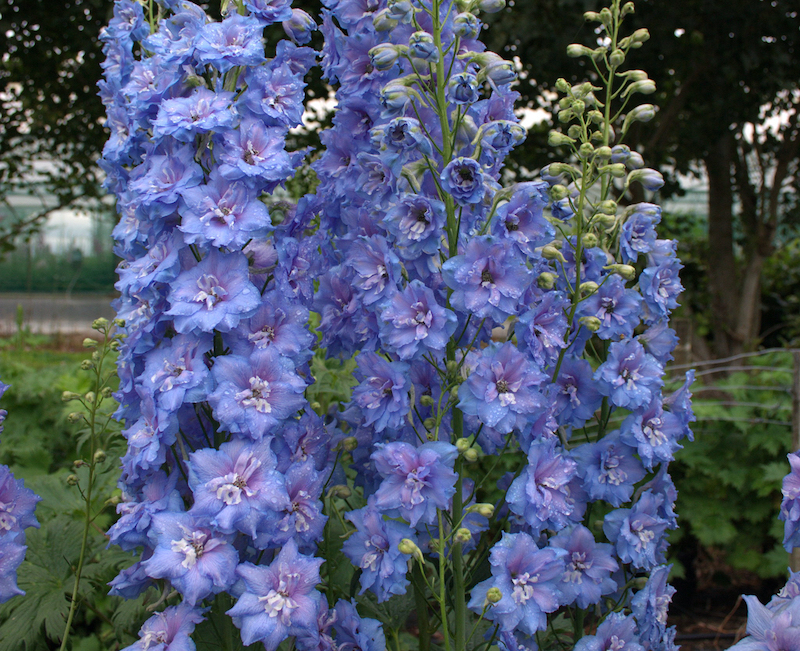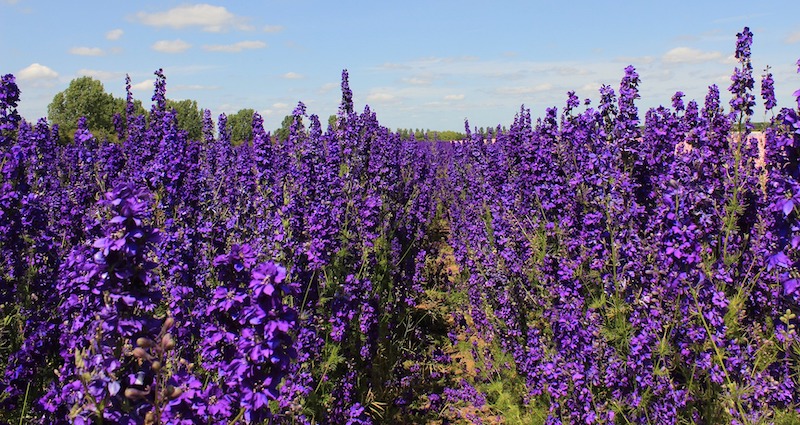Larkspur is in the Delphinium genus of plants that includes over 400 different perennials and annuals. All of the plants in this genus are poisonous to both humans and most animals. All parts of the plant are toxic. The most toxic parts are new shoots in spring. The plants become less toxic as they mature during the season. The main toxin is an alkaloid that causes burning of the skin or mouth and at higher concentrations can lead to paralysis or death.

Are Larkspur Poisonous to Children?
Children can be badly affected by the diterpene alkaloids in Larkspur. Amounts as little as 2 mg can cause death in an adult. Children can have a bad reaction after ingesting far less of the plant. Touching the leaves and stems can also cause severe contact dermatitis in children. If you suspect your child has eaten a part of Larkspur, do not induce vomiting and try to find any remaining pieces of the plant for proper identification. Call your local poison control number or family doctor for immediate advice.

Are Larkspur Poisonous to Dogs?
Dogs are very quickly poisoned by ingesting parts of the Larkspur plant. Depending on the weight of the dog, only a small amount needs to be ingested to cause severe problems. Puppies may be more prone to chew on plants than older dogs and will need to be supervised at all times if there is Larkspur growing in the garden. The Alkaloids in the plant will cause burning of the lips and mouth, severe vomiting, paralysis of muscles and heart, a weakened pulse, cardiac failure, and death. Contact your veterinarian immediately if you suspect that your dog has eaten any part of a Larkspur.
Are Larkspur Poisonous to Cats?
Cats will have the same reaction as dogs to ingesting any part of Larkspur. Cats might not eat as much as dogs would, but their relatively smaller size makes them more prone to a severe outcome. Symptoms include muscle tremors or paralysis, increased salivation, convulsions, and cardiac arrest. The alkaloids in Larkspur have an extremely bitter taste that may be helpful in keeping a cat from taking more than a nibble. If you are worried that your cat has eaten Larkspur, find any remaining part of the plant and take it to your veterinarian to be correctly identified.
Are Larkspur Poisonous to Other Animals?
Cattle and horses that forage in areas where the native Larkspur grows can be affected by eating the plant. Typically, pigs and fowl do not forage in areas where the wild or ornamental Larkspur grows. Cattle and horses would need to eat a significant quantity of the plant in order to have a severe reaction. Eating small amounts may still cause issues with bloat and contact rashes in or around the mouth. Contact your veterinarian if you notice Larkspur growing in the areas that your livestock feed.

Symptoms Of Larkspur Poisoning
Always check with your doctor or veterinarian for guidance if you suspect larkspur poisoning.
Here are some common symptoms to look out for:
- Burning of lips or throat
- Intense vomiting
- Diarrhea
- Muscular weakness
- Spasms
- Weakened pulse
- Respiratory distress
- Convulsions
Preventing Larkspur Poisoning
Larkspur is a beautiful flower for the garden and makes a lovely cut-flower display. It is also a very toxic plant that can cause severe reactions in either humans or animals. The best way to prevent a child or pet from ingesting Larkspur is to not grow it until there are no pets or small children in the family. If that is not possible, the next best safeguard is to restrict access to the plants.
Fencing off a garden where Larkspur is grown will keep children and pets out. Growing the plants out of reach of children is easily done, but pets like cats and some dogs are not easily deterred. Choosing plants that are not poisonous may be the best defense against poisoning.
Pet Poison Helpline
If something were to happen to your furry friend, and you suspect that they are suffering from Larkspur poisoning, there is a poison control hotline to call for 24/7 vet advice. It is called the Pet Poison Hotline, and its phone number is (855) 764-7661.
Sources:
"Larkspur (Delphinium spp.)." U.S. Department of Agriculture. ars.usda.gov
"Larkspur." Colorado State University Guide to Poisonous Plants. poisonousplants.cvmbs.colostate.edu
 |
Author Robbin Small - Published 8-22-2022 |
